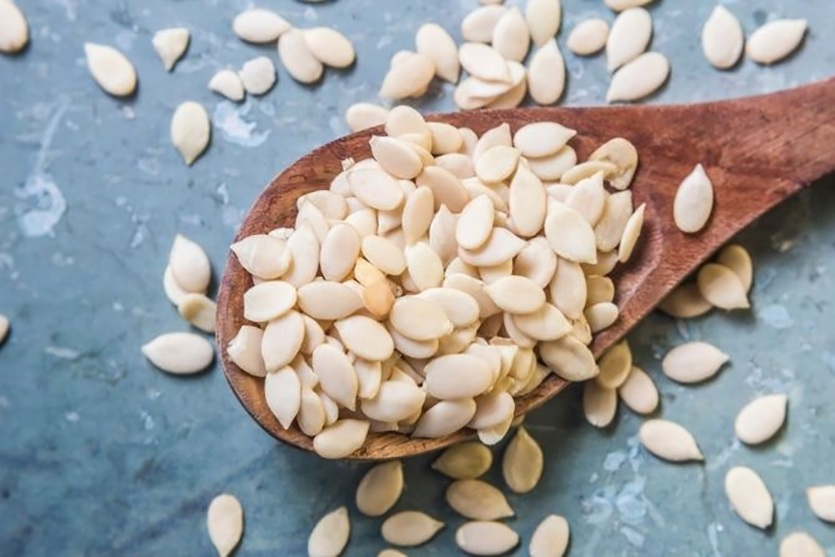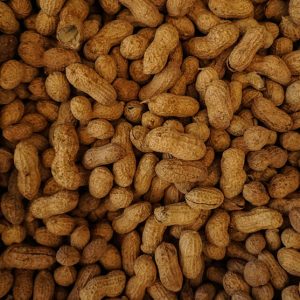Melon Seeds
The melon seed is, generally, a grayish white hard shell with a white inner kernel, which is soft and oval in shape. The seeds of the melon are rich in protein, omega-3 fatty acids, vitamins, fats and other nutrients. It lacks any distinct scent but has a nutty and sweet taste.
Egusi (also known by variations including egwusi, agusi, ohue, agushi) is the name for the protein-rich seeds of certain cucurbitaceous plants (squash, melon, gourd), which after being dried and ground are used as a major ingredient in West African cuisine.
Product Name: Melon Seeds
Botanical Name: Cucumeropsis mannii
Tariff – HS Code: 12077000
Local Productions: Approx 73,000 tons/Yearly
Quality Standards
Chemical composition values were as follows: fat content ranged from 41.6 to 44.5%, protein 34.4 to 39.8%, crude fiber 4.5 to 8.5%, carbohydrates 8.2 to 12.7%, soluble sugars 3.7 to 4.2%, and minerals 4.6 to 5.1%. The content of sterols, phospholipids, and tocopherols in the oils was 0.6, 0.7–1.7%, and 435–828 mg/kg, respectively. The major fatty acid in lipids was linoleic (51.1–58.5%), followed by oleic acid (24.8–25.6%). The trilinolein (31.3–32.2%), oleo dilinolein (31.0–34.0%), and palmitoyl dilinolein (14.9–22.3%) have represented 80.0% from the total triglyceride composition of the melon seeds oil. β-Sitosterol predominated in both free and esterified sterols, being, respectively, 52.9–70.8 and 50.4–58.4%. Phosphatidylinositol (24.4–33.9%), phosphatidylcholine (23.0–33.1%), and phosphatidylethanolamine (8.4–17.1%) were the main phospholipids. Palmitic acid (34.4–61.7%) was the major fatty acid of the phospholipids, followed by oleic acid (8.9–27.2%). Linoleic acid (32.7–39.1%) was the main component among the fatty acids of the sterol esters, followed by oleic acid (25.1–30.7%). In the tocopherol fraction of melon seed oils, the main component γ-tocopherol varied from 71.4 to 91.5%.
Specifications
Melon Seeds : Nutritional value – 1. Melon seeds are rich in unsaturated fatty acids, high quality protein, potassium, phosphorus, calcium, magnesium, selenium and vitamins E, vitamin B1 and other nutrients 2. It contains a wealth of potassium on the heart has a protective function, to prevent a lot of benefits of hypertension 3. Melon seeds are rich in vitamin E, to prevent aging, improve immunity, the role of prevention of cardiovascular disease 4. Melon seeds contained in the plant sterols and phospholipids, can inhibit the synthesis of cholesterol in the human body to prevent excessive plasma cholesterol, to prevent atherosclerosis 5. Sunflower seeds also regulate brain cell metabolism, improve its role in inhibiting the function, it can be used for hypnosis
Package
Central Seal Pouch and Polyvinyl Plastic (PP) Bag.
Uses
The melon seeds are used in baking, dressing of bread cake, confectionery, supari, sweets, refreshing drinks and snack foods. They can also be directly consumed after roasting.
Egusi soup is a kind of soup thickened with the ground seeds and popular in West Africa, with considerable local variation. Besides the seeds, water, and oil, egusi soup typically contains leaf vegetables, palm oil, other vegetables, seasonings, and meat. Leaf vegetables typically used for egusi soup include bitterleaf, pumpkin leaf, celosia and spinach. Typical other vegetables include tomatoes and okra. Typical seasonings include chili peppers, onions, and locust beans. Also commonly used are beef, goat, fish, shrimp, or crayfish.



Reviews
There are no reviews yet.